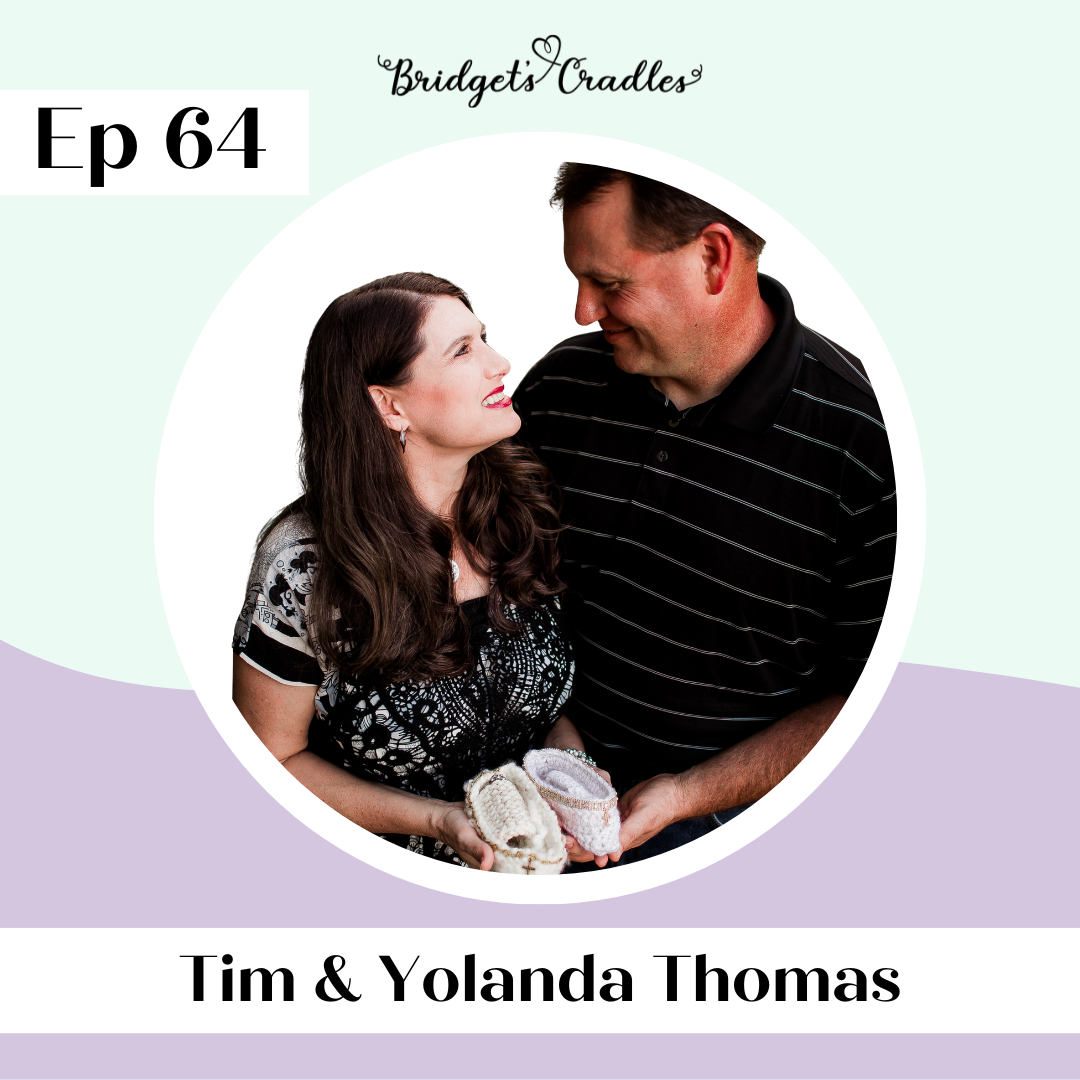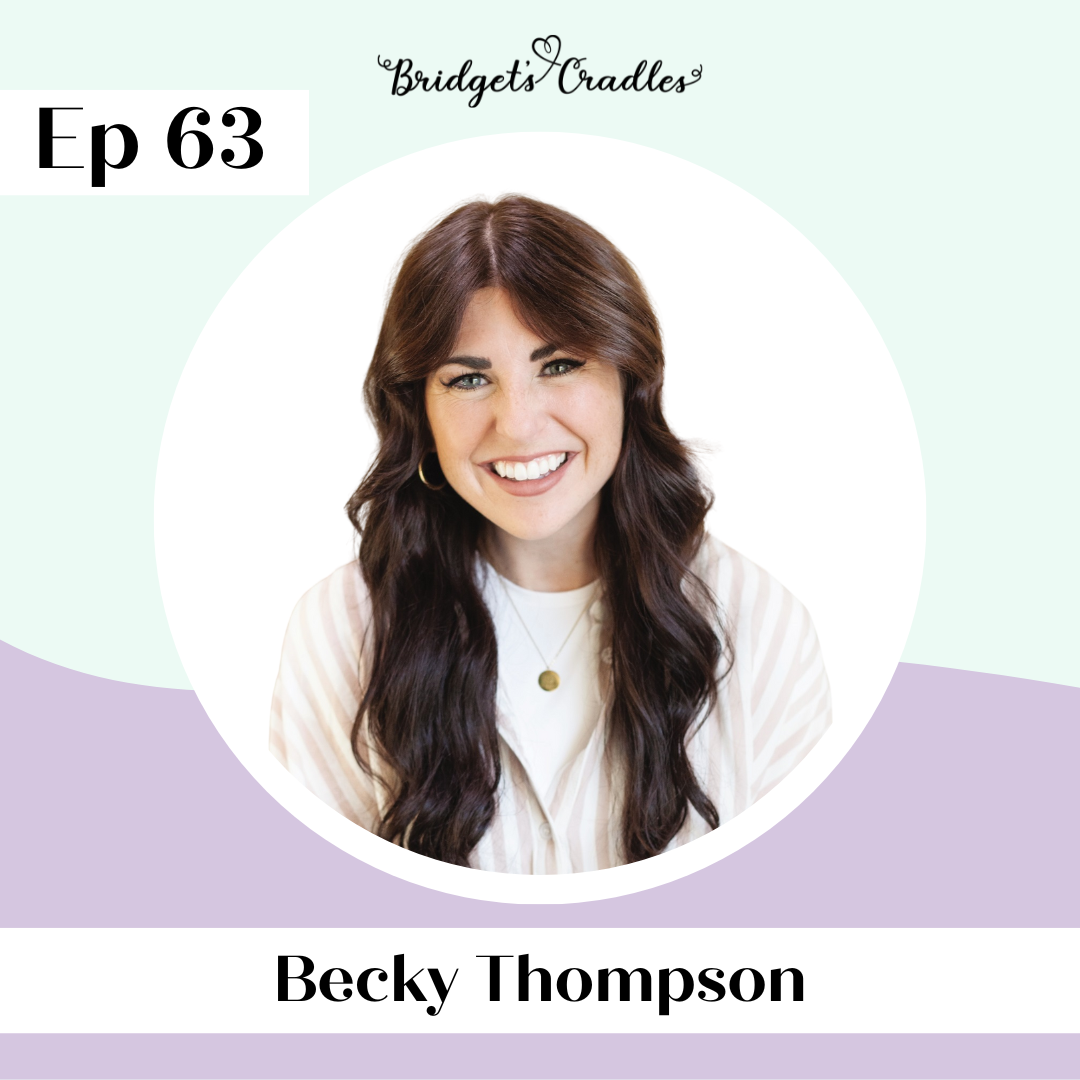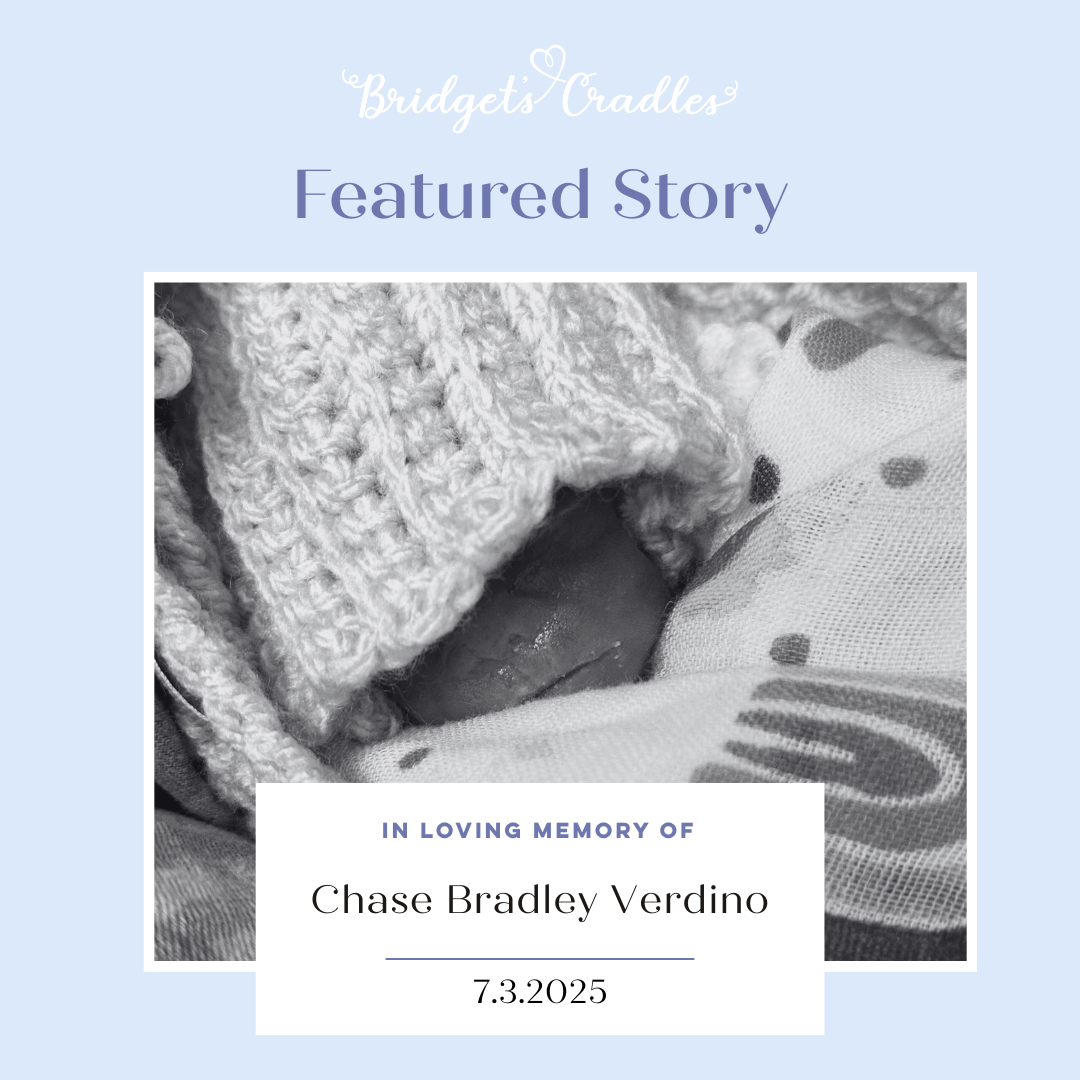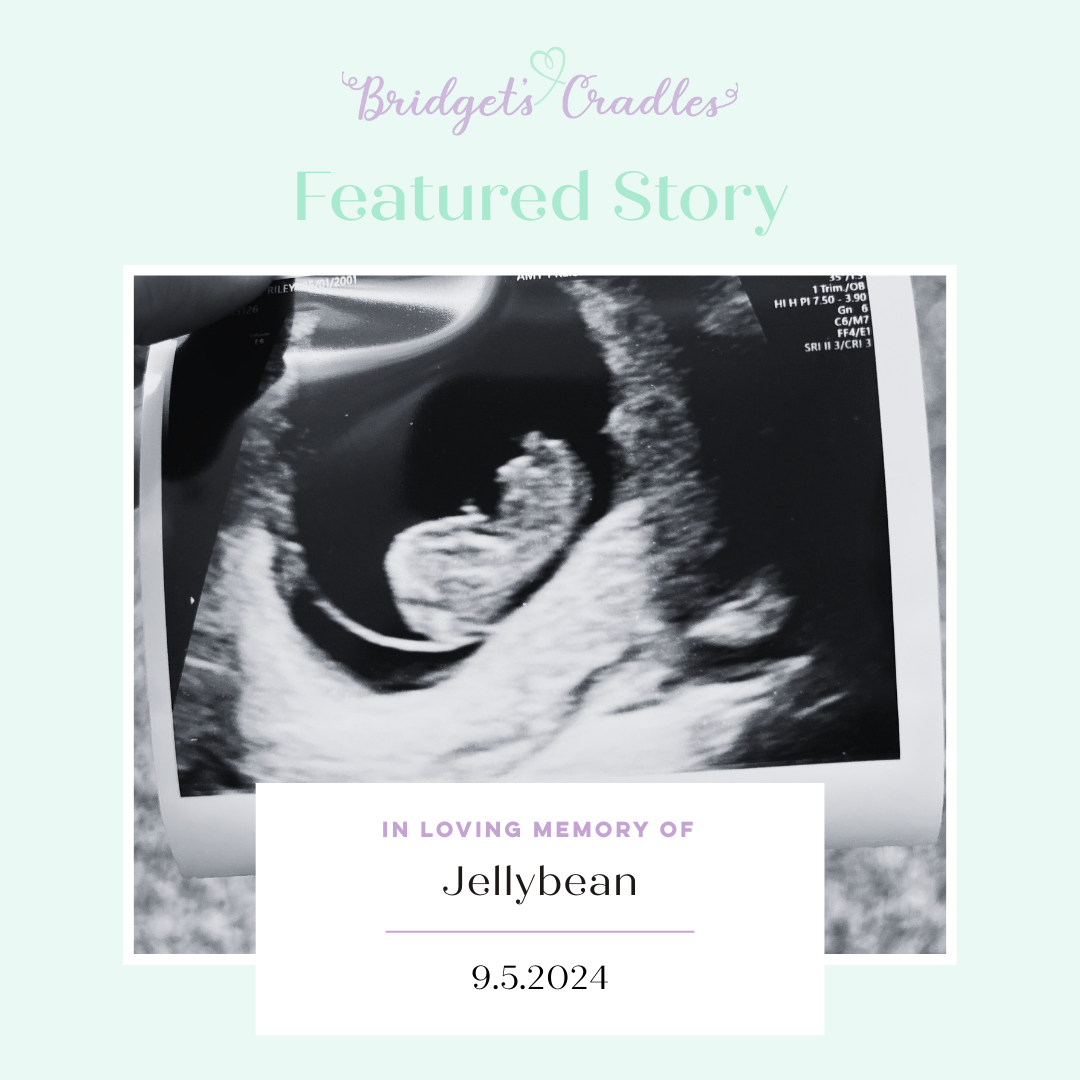Wave of Light | October 15, 2025 Register Now
registration open!
Ep 12 | Cradled in Hope Book Club | Ashley Opliger
November 15, 2025
filed under
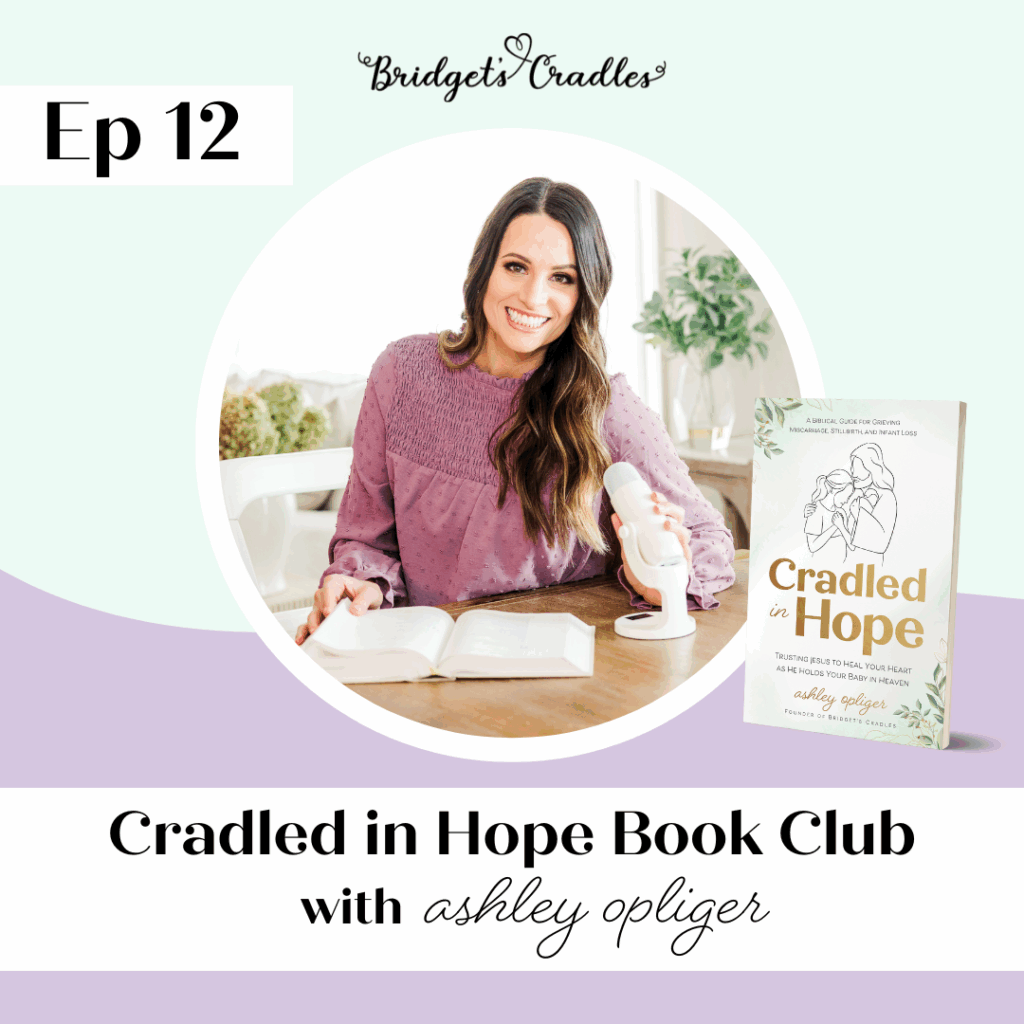
In this episode, Ashley shares a deeply personal story of how grief resurfaced during her third pregnancy, years after the loss of her daughter Bridget. Centered on Chapter 11 of Cradled in Hope, “Holding Both: When You Experience Both Joy and Sorrow,” she reflects on how conflicting emotions—gratitude and grief, joy and sadness—can coexist and create confusion, guilt, and shame for grieving moms.
Through honest storytelling and gentle encouragement, Ashley invites listeners to reframe “either/or” thinking into “both/and” truth. With grace, she reminds moms that it’s possible to feel immense love for one child while still mourning another, and that sorrow and joy can live side-by-side in the sacred space of a grieving mother’s heart.
In this episode, Ashley shared:
- The emotional experience of finding out her third child was a boy, and the waves of unexpected grief that followed
- The phrase “holding both” and how her counselor introduced it as a healing framework for complex emotions
- How expectations versus reality can lead to disappointment—and how the enemy uses that gap to plant lies
- Real-life examples of “both/and” experiences in grief (e.g., being thankful and heartbroken, smiling while missing your baby)
- Why joy does not cancel out sorrow, and laughter is not a betrayal of your grief
- The temptation to tie grief up with a “rainbow baby” happy ending—and why only Jesus can be our redemption
- How rainbow babies can bring joy, but should never bear the burden of being our hope or healing
- Encouragement to trust God’s sovereignty even when your story doesn’t go the way you planned
Ashley reminds grieving moms that time alone does not heal all wounds—but Jesus does. And though we live in the tension now, one day in Heaven, we will no longer have to hold both—because we’ll be holding our babies again.
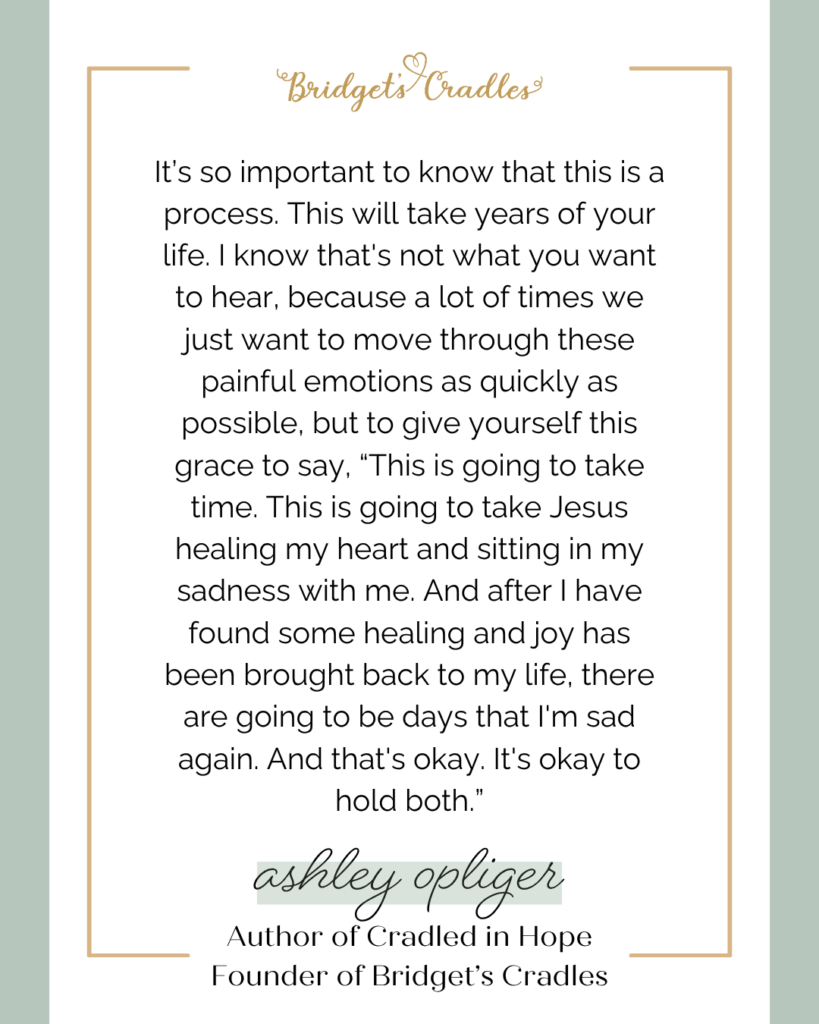
Journaling Prompt
What conflicting emotions have you experienced? Write down ways you are holding both using “and” statements instead of “but” statements.
Healing Step
Have you built a dam to hold back the waters of your grief? Consider breaking it down to let your emotions flow. This release might be the breakthrough you need to move into the next chapter of your healing journey.
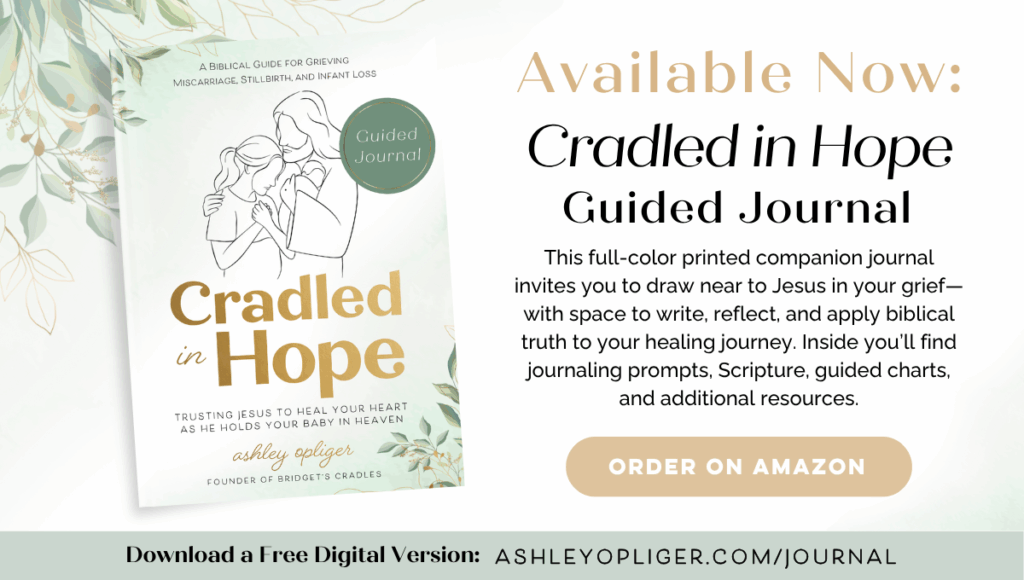
Full transcript below.

New episodes will be shared on the 1st of every month. Don’t miss a single episode…subscribe wherever you podcast!
Please also leave a review to help spread the message of hope with other grieving mommas!
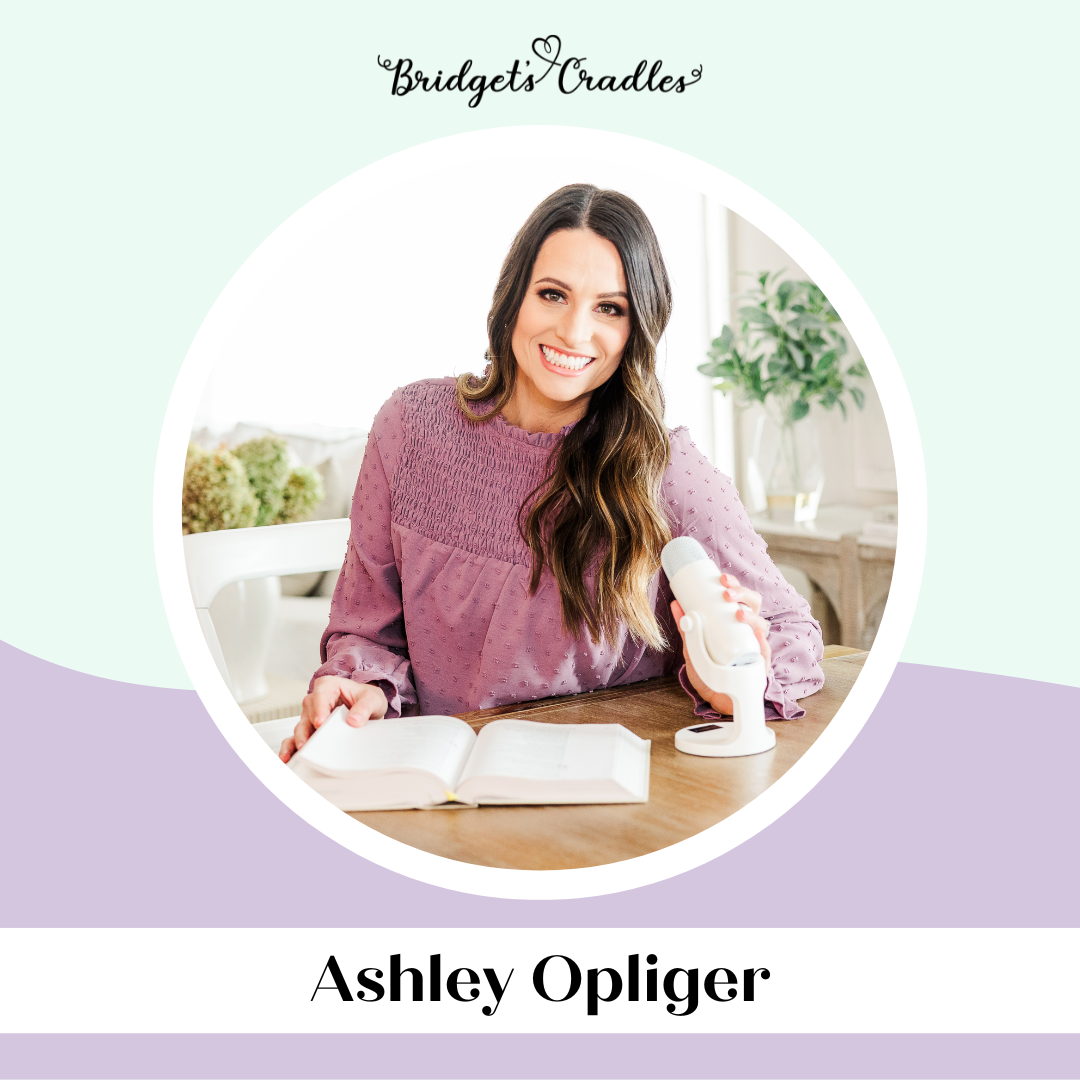
MEET OUR HOST
Ashley Opliger is the Executive Director of Bridget’s Cradles, a nonprofit organization based in Wichita, Kansas that donates cradles to over 1,600 hospitals in all 50 states and comforts over 30,000 bereaved families a year.
Ashley is married to Matt and they have three children: Bridget (in Heaven), and two sons. She is a follower of Christ who desires to share the hope of Heaven with families grieving the loss of a baby.
Connect with Ashley:
Facebook /ashleyopliger
Instagram @ashleyopliger
Pinterest /ashleyopliger
www.ashleyopliger.com
Follow Bridget’s Cradles:
Facebook /bridgetscradles
Instagram @bridgetscradles
Pinterest /bridgetscradles
www.bridgetscradles.com
JOIN OUR FACEBOOK GROUP FOR GRIEVING MOMS
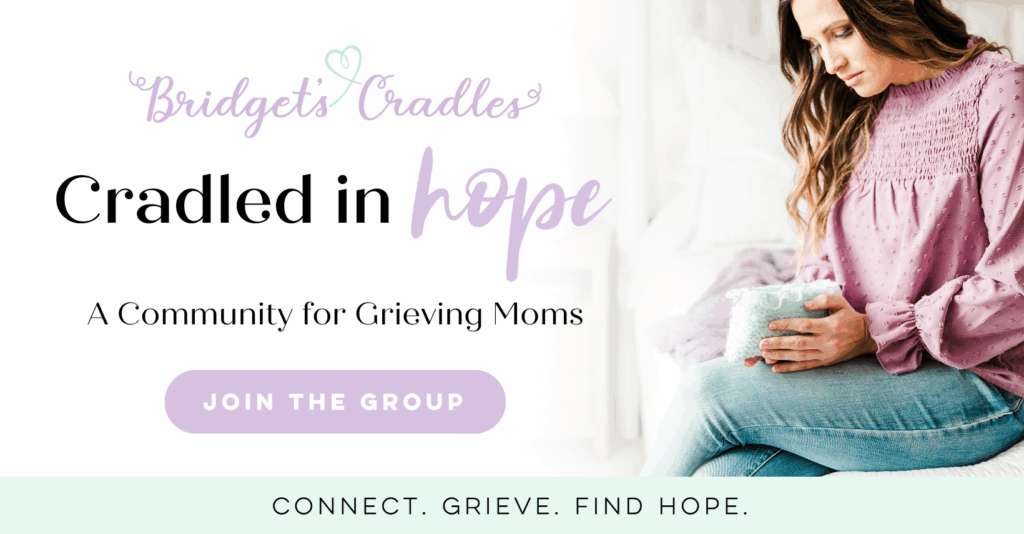
EPISODE TRANSCRIPT
Ashley Opliger: [00:00:00] Welcome to the Cradled in Hope Podcast Book Club.
I’m your host, Ashley Opliger—grieving mom, author of Cradled in Hope, and founder of Bridget’s Cradles. I’m so honored to walk with you through my book, one chapter at a time, as we navigate the heartbreak of losing a baby together.
After my daughter Bridget went to Heaven at 24 weeks, I wrestled with deep sadness and complex questions about God’s goodness. But through that grief, Jesus showed me that He not only cradles our babies in Heaven, He also holds our broken hearts here on earth.
Whether you’re reading along or simply listening in, this is a safe space for your sorrow—a place where your tears, questions, and raw emotions are welcome. Each episode, we’ll reflect on a chapter of Cradled in Hope and gently walk together from heartbreak to healing, and from pain to purpose.
My prayer is that this podcast will remind you that you are not alone in your grief and, most importantly, that it will point you to Jesus, the only One who can truly heal your heart. Through faith in Him, there is hope to see your baby again, and He will be with you every step from here to Heaven.
So wherever you are in your journey, I invite you to join me—and together, we will grieve with hope.
Let’s begin.
Ashley Opliger: [00:01:23] Hi friends. Welcome back. Today, we are diving into Chapter 11, Holding Both: When You Experience Both Joy and Sorrow.
This chapter, the title is very self-explanatory. We are going to be talking about how to navigate coexisting, yet sometimes conflicting emotions that we experience after we’ve lost a baby.
[00:01:44] There are so many different ebbs and flows to grief, and one of those aspects is experiencing all of these different emotions in the same season, and that can be really confusing and difficult. And so let’s start by focusing on the key passage from the chapter.
Today’s passage comes from 2 Corinthians 6:10, “… as sorrowful, yet always rejoicing …” And so there you see that coexisting joy and sorrow at the same time.
So let’s dive into this chapter. And I’m going to be honest, this opening that I wrote for the beginning of this chapter was one of the hardest stories that I wrote for this, because although it doesn’t have the same degree of emotional trauma as some of the stories I shared in the beginning of the book about Bridget’s birth and death, this story was one that happened several years after I lost Bridget.
And it was a situation where I thought I had found a lot of healing. I thought I was in a good place in my grief, and then all of a sudden, it felt like the dam that was holding the waters of my grief back had been put down or completely destroyed, and all of a sudden, all of the water just came rushing out, and there was all of this pent-up emotion and grief.
[00:03:00] And the reason this story was so hard for me to share is because at the time, there was some shame that I felt in the emotions that I was feeling, because this all centered around when I was pregnant with my third child.
We had Bridget in 2014, and then we had a little boy who was born in 2017, and then another little boy that was born in 2021.
[00:03:24] This story is based on when I found out about our third son and his gender. And this moment for me was really hard because I had so wanted to have a little girl. I was so excited when we were pregnant with Bridget. I had always wanted a daughter, and so there was just so much excitement about having her, but then so much grief in not only losing a child, but losing a daughter.
[00:03:49] And so that was really painful for me when we lost Bridget. But in my mind, I thought, “I’m always going to grieve Bridget, but maybe I’ll one day have a little sister and I’ll get to raise a daughter on earth.” I also so badly wanted to have a little boy and to raise a son. And so I felt like, “Okay, God. He’s given me a little boy.”
[00:04:07] So then when we were expecting again, I was thinking, “Maybe now I’ll get to have a little girl and I’ll have a boy and a girl.” And in my mind, I thought this is going to be perfect. And during my early days of my pregnancy with our youngest son, I had a lot of symptoms that I had when I was pregnant with Bridget, but not when I was pregnant with our older son.
[00:04:28] And so, I really thought, “This is a girl and God’s answering my prayers to raise a daughter,” and I was so excited. I had even started pulling out some of Bridget’s clothes that we had bought for her. I had some bins in our storage room with girl clothes and girl blankets, and all of the florals and the mint and lavender colors that we had chosen for Bridget’s nursery.
[00:04:51] And so when we found out that he was indeed a boy, I just entered into such deep sadness. And it was really confusing for me, because on the one hand, I was so grateful to be pregnant and expecting and having a precious child and growing our family. And I loved having a little boy. I loved having our older son and was so excited that our older son was going to have a little brother, and that they were going to get to be best buddies and all of these things.
[00:05:23] And so there was all this excitement and joy and happiness over this new life and this little boy. But yet at the same time, there was this overwhelming sadness about not having a baby girl and not being able to raise a daughter. And that really broke open my grief for Bridget, because I realized I had not fully grieved Bridget.
[00:05:42] And honestly, I still haven’t fully grieved Bridget. I don’t think that we fully do because we’ll always miss them. But I really started questioning how much healing had actually happened in my life.
And so through this season, I felt so confused because I had these feelings, but I didn’t want to feel them because I felt shame over them that I was thinking, “Why am I not feeling more happy? Does this mean I’m not grateful? And I want to be grateful because I’ve lost a child and I know there are so many people who struggle to even get pregnant.”
And I had gone through infertility and it had taken us over a year with fertility medication to conceive, and so I was so grateful to have the gift of life in my womb and for God to bless us with a child.
[00:06:28] Yet at the same time, I was very much grieving this dream that I had to raise a daughter. And so I had not been in counseling at this point for a long time. This was, I would say, about six years after Bridget was born. And so after all of these emotions came up, I decided to go back to my counselor to try to process this.
[00:06:48] And I remember just feeling so worried about how she was going to perceive all of the grief that was resurfacing. And I remember just telling her about the journey that had taken for us to conceive this little boy and how we were just so grateful we were pregnant, and the timing of everything.
If you read in my book, I share more of the details about us moving into a new house, and we had built this new house to grow our family and just the timing of how the Lord had planned it all. It was so perfect and we were so excited.
Yet there was this undercurrent of grief that I was experiencing, and I think some of it was I had envisioned that we were going to have a girl, and I got my mind just wrapped around that and I got all of Bridget’s clothes out and I started pinning things on Pinterest to plan a baby girl shower. And I think I really just let my heart get carried away with this dream.
[00:07:44] And so when we found out at eight weeks that our little boy was a boy, there was just so much disappointment. And that disappointment led me to feeling ashamed.
[00:07:55] So I went into my counselor’s office and I told her all of these things about all of these conflicting emotions in my heart and that I was experiencing: “joy for new life, disappointment over unmet desires, gratitude for the gift of a baby boy and younger brother for my older son, sadness over Bridget and excitement for a future with two sons.”
And so I told her, I said, “I know I should be grateful to have a healthy baby. And I am. I feel bad for feeling this way. I really do love this baby boy. I am excited for our older son to have a little brother. And I believe God chose this boy for us. But I can’t shake this feeling of sadness over not having a girl. It’s making me miss Bridget so much.”
And so I’m reading that part from page 187, but this is when my counselor said, “You know, it’s okay to hold both.”
[00:08:44] And that term I had not ever heard before at that point. I hear it all the time now and I speak about it all the time now, and that’s why I named this chapter Holding Both. But she said, “It doesn’t have to be either or. You can be excited about this baby boy’s life and disappointed you’re not raising a daughter. You can be grateful and grieving.”
And I said in my book, “Her words resonated deeply within my soul and permitted me to feel precisely what I was feeling – both.”
And I think so often we get this feeling that if we have two feelings or emotions that we need to figure out which one should override the other or one should cancel out the other. And especially if they feel conflicting, like joy and sorrow, it feels like those emotions don’t go together. And so usually our brain tries to force us to feel one or the other.
[00:09:36] And so what I really realized was, no, these are not conflicting. These are actually coexisting. And instead of saying ‘but’, I should use the word ‘and’. It’s not, “I’m grateful for this baby boy, ‘but’ I’m missing Bridget.” Instead it’s, “I’m grateful for this gift of new life ‘and’ I’m missing Bridget, ‘and’ I’m grieving the loss of the dream to raise a daughter on earth.”
[00:10:01] And so I think that’s so important to really use those ‘and’ statements, that conjunction ‘and’ instead of ‘but’, because there are so many experiences where you might be feeling both.
I listed some ideas in my book. I’m not going to read them all, but here’s a couple of ideas of holding both. It might be feeling sad for yourself and excited for others. It might be being disappointed in your circumstances and thankful for the blessings God has given you. It might be experiencing pain and finding purpose in it.
[00:10:33] Another example is grieving your baby in Heaven and wanting to have another baby. Those are not ‘but’ statements, they’re ‘and’. And those can coexist at the same time. And so I talk a little more about why we feel this way.
[00:10:47] I think so often we feel guilty for smiling or laughing when we’re grieving. And a lot of times we worry that if we’re not consumed by our grief, if we’re not feeling those overwhelming feelings of sadness, that somehow we are not honoring our baby that we lost. And so we don’t want people to perceive this outward happy appearance as we’ve moved on, or we’re doing fine, and so a lot of times hold onto grief or at least the appearance of grief because it is an expression of our love.
[00:11:18] I remember after we lost Bridget, I had a really hard time going to social events or just having everyday surface-level conversations with people. It was so hard for me to engage in those conversations because I had this overwhelming sense of grief and sadness, and I didn’t want to talk about things that felt so trivial to me.
[00:11:38] And I think that as we’re talking about this, I want you to understand that it is okay to let yourself feel temporary moments of happiness, it is a respite for you in the midst of all-consuming grief, and also to understand that others don’t see the whole picture of your grief.
I use the example: Two months after Bridget was born into Heaven, we were invited to go to Europe with my in-laws on a Christmas market trip to three different countries to go see the beautiful cities of Budapest, Vienna, and Prague. And I really worried what people were going to think about Matt and I going on a trip so soon after we lost a baby.
In fact, we had been invited on this trip long before we lost her, but we had turned it down because I was going to be pregnant and expecting Bridget in a month and a half. And so it didn’t make sense for me to be traveling long distance so far along in my pregnancy. I didn’t feel comfortable about that, so we declined going on the trip.
But then after we lost Bridget, we had the conversation. “Is there still a place for us? Because we think it might be really good for us to get away, just the two of us, to go and just escape our normal life and have time together and to reflect.”
[00:12:52] And that ended up being really good for us. But there was this fear in the back of my mind. “If people see us going on this trip, are they going to assume that everything’s back to normal, that we’re happy, that we’re not grieving our daughter?”
[00:13:12] And I just want to say that that is absolutely not true. We did so many things on our vacation to honor her.
We brought these dried lavender flowers, and we actually would sprinkle them in the rivers because there are a lot of beautiful bridges in that part of the world. And so we called it Bridges for Bridget, and that was just something we did in the midst of our pain.
[00:13:25] And that was an example of holding both. We’re going on this trip together and we’re going to enjoy time away, ‘and’ we miss our daughter and we’re going to continue honoring her in the ways that we felt we wanted to in our hearts for our grieving and healing journey.
And so for you, it might not be a trip to Europe, but it might be going to a wedding, going on a weekend getaway, attending a family event, something like that, where you feel as though if you go to that event, people are going to assume that you’re better.
[00:13:56] I just want to give you permission to say that if you don’t feel like going to that event because of your grief, that it’s okay to say no, but if you do feel like going and you want to go and you feel that it would be good for you, that your presence there is not the whole picture of your grief, that people do not see the tears that you cry behind the scenes.
[00:14:15] And if you go to this event and you smile and you laugh, but yet at the same time you feel these feelings of sadness in your heart because you’re missing your baby, that is an example of holding both. And it’s okay to hold both of those at the same time.
[00:14:35] Also in this chapter, I address the idea of the progression of healing and how sometimes, when we’re feeling conflicting emotions and we’re feeling these holding both kinds of situations, that we will question whether we’re really healed, as I did after we found out that our son was a boy.
I want to insert this here. I have a little note at the end of the chapter because I felt like it was really important for me to say that our son, Brenner, is just a delight. I refer to him as “joy personified.” He is so silly and smart and fun, and has brought so much joy to our life. And so I just want to follow up on how that story played out.
[00:15:14] I had all of those feelings and I worked through them in counseling. And I really grew to become very excited about having another little boy. And when we met him when he was born, we just were so overjoyed and happy to have him, and he has been a delight in our family. And I truly feel as though I would not trade him for another child. I would not want him to be a girl. I would not want another soul in our family other than him.
And so I think that what the Lord did in my heart was just surrender to His plan, that in His sovereignty and His will, He saw fit that I would have a daughter in Heaven and two boys on earth. And I trust in that plan, and I’m grateful for the children that I’ve been given.
[00:15:57] That doesn’t negate the ache that I felt or continue to feel, not having a daughter to raise on this earth. But I think what the Lord has done is just really healed me and allowed me to hold both of those things in a very healthy way.
[00:16:11] And so I just want to say I am so happy that we have Brenner. And the reason I share this vulnerable story in my own life, I hope and pray that it would give you the courage to just speak honestly about how you’re feeling and not let shame override that, that you would be able to bring these emotions out into the open and have a chance to really work through those emotions with a counselor, with the Lord.
Because I think when we are honest about our emotions, that’s really when the Lord can heal us and have breakthrough. And so I just wanted to say that before I continued on.
[00:16:45] Another thing that I experienced during my second son’s gender reveal was I started thinking about, “Wow, there is still a lot of grief here. I am really feeling like the floodgates of my sorrow have just come out over the loss of Bridget.” And this was years later.
And so I started wondering, “Has God really healed my heart like I thought?” Because I thought that I was content and that I had really found acceptance in God’s story. And I was living a very fulfilled life, raising my older toddler son, serving in ministry, expecting again. I had so much joy in my life. And so I was so confused as to why there was so much grief so many years later.
[00:17:11] And maybe you have experienced this. Maybe it’s been years since you lost a baby, and all of a sudden you feel like the floodgates have opened again. Maybe there is a life milestone, whether it’s another child being born, whether it’s a move, it’s a job change. It could be so many different things that would cause you to enter back into grief, and it might not even be triggered by a life event or milestone. It could just be something where your brain and your body are processing it again.
[00:17:55] You’ve probably heard the book, The Body Keeps the Score, and a lot of times that time of year when you lost your baby, your body remembers, your brain remembers, and those emotions can really come up and resurface.
Ashley Opliger: [00:18:09] We hope you’re finding encouragement in this episode so far. We want to take a moment to share some resources our ministry offers to support grieving moms like you.
On our website, bridgetscradles.com, you’ll learn more about our nonprofit and find many hope-filled resources, including free e-books to help you plan a memorial or funeral service for your baby, meaningful ways to honor your baby in your heart and home, and gentle guidance for navigating difficult days like due dates, Heaven Days, and holidays.
We invite you to join our community of grieving moms through our Christ-centered support groups, offered both in-person at our headquarters near Wichita, Kansas, and virtually through Hope Online. These gatherings provide a place to find comfort, connection, and biblical hope alongside other moms who understand your pain.
You can view upcoming dates and sign up on our website. While you’re there, we’d also be honored for you to share your baby’s story with us.
For ongoing support, we welcome you to join our private Cradled in Hope Facebook group—a safe space for grieving moms to find friendship and walk their healing journey together.
To stay connected with us and receive faith-filled encouragement, follow us on Facebook and Instagram at @bridgetscradles, @cradledinhope, and my personal page @ashleyopliger.
Now, let’s get back to the episode.
Ashley Opliger: [00:19:30] I just want to give you grace that it is okay if those feelings are coming up, even years later. Even if it’s decades later, your baby is worthy of being grieved.
[00:19:41] And I have found in my journey that whenever these emotions come to the surface, it is an opportunity for the Lord to heal me in ways that He hasn’t before. In other words, if you think about grief like an onion, and that’s a really interesting example, and I actually don’t even use that example in the book. It’s coming to me right now.
[00:20:01] But there are layers to grief, and I believe that the grief of losing a baby is so traumatic and so life-altering and soul-shattering and heartbreaking that we cannot just be instantly healed of a grief and a loss so deep as that.
And so it’s almost as though the Lord has to just heal parts of us, these layers, over time because the grief is deep and it shatters so much of us in that process.
[00:20:29] And so in a sense, if we’re using the onion example, I don’t know if that’s the best example, but that’s just what came to me at this moment, is that over time for me, there’s been more layers, deeper layers, like we’re getting closer to the center of the onion. And the more that grief comes up, the more that God has this opportunity to dig deeper into my heart and to heal these layers that have been there.
[00:20:53] And I have this diagram that is on page 190, I would love for you to go look at it. But essentially I think what made all of the grief come out for me was any time you have expectations and then there’s a discrepancy between those expectations and what reality is, that’s where disappointment lives.
[00:21:13] And so I had this expectation in my mind, probably since the time I was a little girl, that I would have a daughter on earth and that I would be able to raise her. And I had this dream and hope that I would one day have a daughter.
And so when reality, my life story, was not playing out that way, that discrepancy of “This is what I hoped and wanted and this is not what I’m getting,” and that’s where that space of disappointment lives. And I think Satan wants to keep us in that space of disappointment.
[00:21:46] And for me, over time throughout my life story, and this goes way beyond this story with my son. This goes to the loss of Bridget. It goes to losing my dad to a drunk driver. There are all these other aspects of my story from my past of relational rejection and betrayal that I faced in my early twenties in my first marriage due to adultery. There are so many things that I’ve walked through in my life that have been so painful that I’ve questioned God. “Why? Why are You letting this be part of my story?”
[00:22:18] I had wanted to be married to one man and one man only. I had wanted to have three children. And you have this idea of what your life is going to look like, and then when trials come, when people make choices that you cannot control, when you face things in the brokenness of the world, in our own bodies, that we cannot control, so many things in my life, I think it was outside of my control.
I couldn’t control that I lost Bridget due to complications in my pregnancy. I couldn’t control someone else’s decisions about driving drunk that night. I cannot control others’ decisions about whether or not they were going to be faithful in a marriage.
And sometimes the trials are brokenness in our own life, of our own decisions and our own sin that can cause trials, whether it’s a sin in us, sin in other people, or just the brokenness in our bodies and in our world.
[00:23:06] But I think when we experience them, there’s a discrepancy because we did not expect them. We did not want those trials. Who would want any of those trials to happen? Right? Satan is going to lie to you and say, “God must not be good. God must not love you. He’s abandoned you. Look at the story He’s writing for you. It’s not a good story.”
[00:23:25] And I think that is where we have to put the enemy in his place and say, “You know what? Even through trials and difficulty, which Jesus told us we would face trouble in this world, we are not immune to suffering as Christians and as humans on this broken earth, there is a solution to that.
There is Jesus, who has overcome sin and death. And one day we will be on the New Earth without sin and death, and we will live forever in this perfect state.”
But for now, we’re living in a broken world and Satan really wants to remind us that our expectations, our hopes, and our dreams are not happening, and our life story is not going the way that we had hoped.
[00:24:04] And I have found so much healing in trusting in God’s sovereignty and saying, “You know what, God? I would’ve written my story differently, and I wanted my story to be written differently, but I’m going to trust You as the Author of my life because I have seen You be faithful in these trials and through this grief and all of these things that I’ve walked through. You have been sanctifying me in it, and You have been pruning me to bear more fruit for Your Kingdom. And I see how You’re using it for good and for Your glory and for building the Kingdom. And because of that, I trust You. I trust Your faithfulness even in these trials.”
[00:24:42] And so some of what I’m sharing right now is in this chapter, but I’m also alluding to some content that’s in our next chapter. So be sure to tune in for Chapter 12, More Than Gold.
But what I am talking about here is how the enemy is going to try to convince us that we are not making progress in our spiritual growth, that we are not healing, that God is not with us in our grief. And so whenever these floodgates open again, he’s going to use that to invalidate the healing and the work that the Lord has done in our heart and our lives.
[00:25:14] And so what I want to encourage you is this holding both mentality of, “Yes, the Lord is healing me and I still grieve and I still ache. And I still miss my baby, and that ache will probably be there the rest of our lives, because until we’re reunited with our babies, our hearts are not going to be fully healed because we were not meant to be separated from our children. Death was not part of God’s good and original plan for us.
[00:25:43] And so the encouragement here is that once we reach Heaven and we are reunited with our precious children, there will be no need to hold both because we will be holding them, and most importantly, we will be in the presence of Jesus, which is our ultimate prize and our ultimate joy and pleasure to be with our Creator.
[00:26:03] But earthside, how long until this all-consuming sadness subsides? Because so many times we hear the phrase, ‘Time heals all wounds’, and I have really found that time does not heal on its own.
If you look at the bottom of page 191, I say that “Grief + Time ≠ Healing. Jesus + Grief + Time = Healing” because if you solely grieve over the course of time, there cannot be healing because you’re just going to be stuck in a perpetual state of sadness.
[00:26:37] But if you allow Jesus to heal you over time, and it does take time. Yes, He can instantaneously heal us. He’s capable of doing that. He has the power to do that. But oftentimes it is this slow peeling of the onion, as I shared before, healing these layers of us and going deeper and deeper into our hearts. And so we really need Him to heal us over time, because just time alone will not give you the healing that you so desperately desire.
[00:27:07] And so this chapter, I do talk about the stages of grief. I talk about the five stages that we’re accustomed to hearing, and I debunk some of that because I do think that those stages are not linear. It’s more cyclical. They ebb and flow.
And understanding that can be really helpful because I think sometimes people hear those stages and think that you need to be progressing from one stage to the next. And so when you do fall back or have this overwhelming sense of grief years later, you start questioning, “I thought I had reached here, but now I’m here.” And that doesn’t make sense.
[00:27:46] But understanding actually grief is cyclical, and I have my own little chart, that just grieving does not lead to healing. It’s more grieving leads to healing, which leads to more grieving, which leads to more healing.
And so I share that this cycle is going to repeat itself until, “He who began a good work in you has carried it out to completion.” That’s referencing Philippians 1:6.
[00:28:12] And so I think it’s just so important to know that this is a process. This will take years of your life. And I know that’s not what you want to hear, because a lot of times we just want to move through these painful emotions as quickly as possible, but to give yourself this grace to say, “This is going to take time. This is going to take Jesus healing my heart and sitting in my sadness with me. And after I have found some healing and joy has been brought back to my life, there are going to be days that I’m sad again. And that’s okay. It’s okay to hold both.”
New waves of grief are just opportunities for Him to continue to heal your heart, and they sometimes expose unhealed areas that need the Lord’s touch, that need breakthrough by being honest with Him about where you are. And so I talk a lot about that in this chapter.
[00:29:01] The final part of this chapter is that I talk about rainbow babies because there’s that term, rainbow baby, which is a baby that’s born after a loss. They refer to stillbirth or miscarriage as the storm, and then you have a living baby and they call that a rainbow baby.
[00:29:18] I think that sometimes we think that having a rainbow baby is going to fill the void in our hearts for the baby that we lost. And I bring this up because I’m talking about my other children and the fact that we had this little boy, and I think sometimes this feeling as grieving moms that if we have another child, that that will bring joy back and that will help heal us.
[00:29:42] And I definitely want to say that it will bring joy, because every child is a gift from God, and there will be joy. But that baby is not going to be the one that heals your heart.
A lot of times we want to tie up sad stories with a pretty bow and a happy ending. And I think it’s important for us to think about: What is that happy ending for us?
[00:30:06] And there might be a tendency to think that the rainbow baby is the happy ending in your story. And yes, another baby would bring you joy. But I think what I want to share here is that our hope can’t be contingent on our circumstances or expectations.
As we talked about earlier, the difference between expectations and our reality is where disappointment lives.
[00:30:29] And I think what I have learned in my own journey is that I do not get to determine the number of children that I have on earth. I do not get to determine the gender of my babies. That is the Lord’s. He is the Author of life.
And I think sometimes when we have these expectations and make our expectations or our desires an idol in our life, and I certainly think that we can make our children, living children or even children in Heaven, an idol.
And that’s not something that we talk a lot about. But my friend Moria, with Holy Ground Retreats, she’s actually been talking about that more on her Instagram, if you want to go check that out. But I don’t want to go too much into that right now.
[00:31:11] But I do think that’s very possible. I’ve seen women who have lost a baby and then struggled with infertility and really struggling in their faith because God’s not giving them another child. And it’s this question of, “How could You, God? How could this be my story? I’m praying to You. I believe in You. I want to raise a child to know You”.
[00:31:30] And I think that can really breed a lot of disappointment if those desires are not met. And I do want to say I feel for you if you have lost a baby, if you are going through infertility. I have faced both, and I know the pain and the struggle and the sadness and anxiety that are accompanied by walking through those, and so I am not at all diminishing how painful those are.
[00:31:58] But I just need to say that, “Babies cannot be where we place our hope, nor can they be the redemption plan for our loss – that is too big of a burden for a child to carry. The baby our hearts truly long for is the One who laid in a manger in Bethlehem over 2,000 years ago. We hinge our hope on Jesus’ birth, life, death, and Resurrection! Our happy ending is not here on earth. It is in Heaven. Jesus is our redemption story.”
Those are direct quotes from my book because this is so important for us to know that no matter what happens, no matter how our story is written, God has a good plan for our lives. And we are guaranteed a happy ending, no matter how many trials you have faced.
[00:32:43] Speaking for myself, I’ve detailed some of the major trials of my life and I’m only 37 years old right now, and so there are going to be more trials. And I know that no matter what comes, no matter what I face, God is going to be with me and He is writing a good story for me. And He has given me the promise of eternity in Heaven through salvation through Jesus. So therefore, come what may, there is a happy ending to my story.
[00:33:13] And I want to encourage you with that, because so often we can put our hope in things, in people, in future plans that we hope materialize. And if you are praying that the Lord would bless you with a baby. I’m praying that with you. Those are good, godly desires to have.
[00:33:31] So please hear me say that children are a gift from the Lord, and it is a good, godly desire to be fruitful and multiply. Yet at the same time, this is the holding both that we’re talking about, at the same time, the desire to have another child cannot be where you place your hope.
[00:33:49] So I am so grateful that the Lord blessed me with two boys after we lost Bridget. But even if I had not had more children, and even so that I did not have another daughter on earth, I’m still going to praise Him and say He is good and He is writing a good story for me.
[00:34:07] It is not the story that I would’ve written, but praise God, I’m not writing my own story, to be honest, because if I was writing my own story, I would omit all the pain and the suffering.
And you’re probably thinking, “Well, of course you would. Why wouldn’t you?” And I think we all would. Right? But if we took out all the pain and the suffering in my life, and I’m speaking for myself, I’m not saying that you feel this way about your life right now, but my prayer is that maybe one day you would, if we were to take out all the pain and suffering in my life, I would not be who I am today.
[00:34:36] I would not be sharing the Gospel on this podcast, in my book, in the ministry of Bridget’s Cradles. I wouldn’t be doing any of that. And so I am thankful that the trials that I’ve walked through have stirred in me a desire to follow Jesus and to proclaim the Gospel.
[00:34:55] And even though I wish these things wouldn’t have happened in my life, I am so grateful for them because of how God is using them. And it ultimately comes to a place of surrender, of saying, “Okay, God, even though this is not what I want, I’m going to trust You with my story.”
And that’s really hard, especially in the moment, because I would say to you right now, I’m a year out from my dad’s death, that I don’t yet fully feel that way about my dad’s death. I wish he were here. I wish that would’ve never happened.
[00:35:24] And with Bridget, I’ve had over a decade of grief and healing, and I’ve seen so much come out of her life and all the things that God is doing through the ministry. And I have full acceptance to say, “I trust You, God, that You had a plan and a purpose for her life, and that You have a plan and purpose for my life, and I am honored to carry out her legacy for You, Jesus.”
[00:35:47] And so I just want to say that for you, because it can be really hard to navigate all of these feelings and wonder, “What is God doing with my story? And I’m feeling all of these things.” And so it can be really hard to navigate all of this. And I pray that this chapter on holding both would give you that understanding and grace to hold both in your own life.
[00:36:10] And so I’m going to close with the final part of this chapter; I talk about the rainbow. We’ve been talking about rainbow babies, and the rainbow, biblically, is actually a sign of God’s covenant with humanity that He would not flood the earth again. This is in Genesis 9, and so I like to think of rainbows as a sign of His faithfulness and that His faithfulness, rather than the promise of a rainbow baby or the promise of X, Y, or Z, you can fill in the blank with whatever it is for you, Jesus is the bow that wraps our stories in hope.
[00:36:40] Okay, we are going to close with a Time With Jesus journaling prompt, and I want you to think about what “conflicting emotions you have experienced and write down ways you are holding both, using ‘and’ statements instead of ‘but’ statements.”
[00:37:00] For the Healing Step, “Have you built a dam to hold back the waters of your grief? Consider breaking it down to let your emotions flow. This release might be the breakthrough you need to move into the next chapter of your healing journey.”
Let me close us in prayer.
Jesus, I thank You so much that You are with us in all of our emotions. So often we feel both grief and gratitude, joy and sorrow, and we feel confused, as though those feelings are conflicting. And how can they possibly coexist at the same time?
But Lord, You sit with us in all of it. You are the makers of our heart. You understand our hearts. You allow us to feel these emotions at the same time.
And so, God, I just pray that for every mom listening, that she would give herself grace to hold both, that she would use ‘and’ statements, not ‘but’ statements, that she would not shame herself for her emotions, and that she would allow You, Lord, to heal the unhealed parts of her heart, that as new grief resurfaces, Lord, that You would peel back the layers and continue to heal her heart and sanctify her into the woman that You have created her to be.
Lord, I pray that You would remove disappointment from our hearts and thwart the enemy’s plans to use disappointment to mistrust You, Lord, that we would trust in Your plan as the author of our lives, that You are not withholding anything good from us, that You have a good plan, and that You have a happy ending, guaranteed and promised for each person who is in Christ, and that is eternity with You in Heaven and reunion with our babies there. And we cannot thank You enough for such an amazing gift.
Jesus, I pray that we would rest in Your faithfulness and trust in Your promises. It’s in Your Name we pray. Amen.
Be sure to tune in for the next episode, which will cover Chapter 12, More Than Gold: When You Allow God to Transform You.
Ashley Opliger: [00:38:55] Thank you for joining me for today’s episode of the Cradled in Hope Podcast Book Club.
New episodes covering each chapter of the book will release on the 1st, 15th, and 22nd of each month through the end of the year—so be sure to subscribe and follow along.
If you don’t have your copy of Cradled in Hope, you can find it wherever books are sold. It’s a biblical guide for grieving moms after miscarriage, stillbirth, or infant loss—filled with vulnerable emotion, biblical wisdom, practical guidance, and hope-filled encouragement.
To accompany the book, I’ve also created the Cradled in Hope Guided Journal—a beautiful companion that includes space to write your responses to the discussion questions, full Scripture passages from each chapter, and additional reflection pages and guided charts to help you process your grief and draw you closer to Jesus. You can download the free digital version on my author website at AshleyOpliger.com/Journal, or order the printed version on Amazon if you prefer to write by hand.
Until next time, know that you are not alone. You are seen, loved, and Cradled in Hope.
I have a fancy professional bio here, but what is most important for you to know is that my first and only daughter, Bridget, went to Heaven and Jesus was the only One who could put the shattered pieces of my heart back together. Maybe your heart is broken too?
If so, I'm here to be your friend and walk with you on your grief journey. More importantly, I'm here to point you to Jesus, the only One who can heal your heart and promise you eternity with your baby in Heaven. Hold my hand, friend, and let's start this journey together.
I'm a grieving mom who found comfort in Christ.
Welcome, I'm so GlaD You're Here
More Stories That May Speak to Your Heart
Additional Reads
Spotify
Apple
Ways To Listen
Hosted by Ashley Opliger, this podcast offers Christ-centered comfort to moms grieving the loss of a baby in Heaven. Each episode is rooted in Scripture and points your heart to the truth of the Gospel, the presence of Jesus, and the eternal hope of being reunited with your baby in Heaven.
Listen to Our Podcast
welcome to cradled in hope
Donate Online
Make an eternal impact. Your donation comforts grieving families with cradles, support, and the hope of Christ.
Find a Community
You don’t have to walk this road alone. Join a Christ-centered community of moms who understand your grief.
Read the Book
Discover comfort, hope, and biblical encouragement in Cradled in Hope, written by Ashley Opliger for grieving mothers after baby loss.
Christ-Centered Comfort and Guidance for Grieving Families
Honor your baby’s memory with kindness. Explore 50 thoughtful ideas—plus a free customizable RAK card to share their legacy of love.
Random ACts of Kindness in Memory of a Baby in Heaven
Find meaningful ways to honor your baby on birthdays, due dates, and holidays—offering remembrance through cherished traditions.
Honoring Your baby on Milestones and Holidays
Offer support to a grieving parent with practical ways to help and 12 heartfelt gift ideas designed to bring comfort during deep loss.
Supporting a Loved One After the loss of a baby
Navigate life after loss with gentle guidance for grieving, healing, and finding hope in the midst of heartbreak.
Grieving and Healing After the Loss of a Baby
free e-books
Grab your free copy
How To Grieve & Heal After The Loss of a Baby
Find hope in the heartbreak of pregnancy and infant loss. This guide offers practical ideas and faith-filled next steps in navigating a path forward in your grief.
